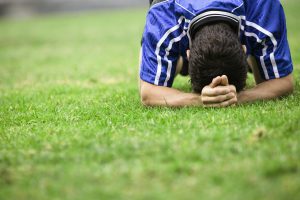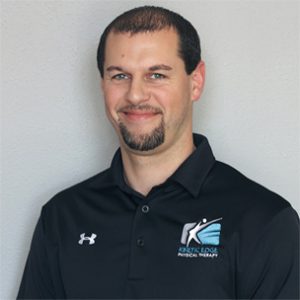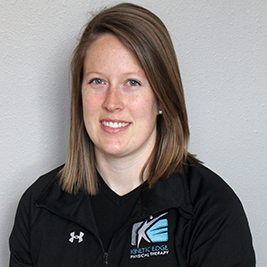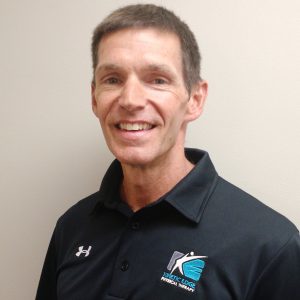by Dustin Briggs, Health & Injury Management & Prevention Coordinator
 Brain injuries in sports are a hot topic right now. With the recent findings on Tyler Sash’s brain and the release of Concussion with actor Will Smith, there are more reasons than ever for a parent to fear the safety of their children in sports. However, you don’t need to immediately wrap your child in bubble wrap or pull them from a game to keep them safe. There are three things that will help you as a parent keep your child safe in the face of brain injury, but first we should identify what a concussion is.
Brain injuries in sports are a hot topic right now. With the recent findings on Tyler Sash’s brain and the release of Concussion with actor Will Smith, there are more reasons than ever for a parent to fear the safety of their children in sports. However, you don’t need to immediately wrap your child in bubble wrap or pull them from a game to keep them safe. There are three things that will help you as a parent keep your child safe in the face of brain injury, but first we should identify what a concussion is.
When you hear the word concussion, you likely think of someone knocked unconscious during a game. However, a concussion is defined as a temporary disruption of brain function and can happen to a variety of extremes through a bump, blow, or jolt to the head or body. Even “getting your bell rung” or what seems to be a mild bump to the head that doesn’t lead to unconsciousness can be serious.
So here are the top three things every parent should know about concussions to keep their child safe and healthy:
Be proactive in preventing concussions: While it’s impossible to predict when a concussion will occur, there are ways to help prevent them from happening.
- Know who you’ll go to in the face of a concussion: Ensure your child has direct access to an athletic trainer or other health care professional trained in concussion management. That way, when this unexpected event occurs, you know who to go to right away for help.
- Wear proper gear: Making sure your child is wearing the right protective equipment for their activity and checking to make sure it fits properly, is well maintained, and worn to manufacturer’s recommendations is a basic first step.
- Follow the rules: Check to make sure your child follows the coaches’ rules for safety and the rules of the sport, and encourage them to practice good sportsmanship at all times. Rules help keep all kids safe!
Understand the signs and symptoms of concussions: Signs and symptoms of a concussion can show up right after the injury or you might not notice them until days after the injury. If your child reports even one symptom of a concussion from the list below or if you notice the symptoms yourself, keep your child out of physical activities and seek medical attention right away.
- Headache or “pressure” in head
- Balance problems or dizziness
- Sensitivity to light or noise
- Concentration or memory problems
- Just not “feeling right” or is “feeling down”
- Nausea or vomiting
- Double or blurry vision
- Feeling sluggish, hazy, foggy, or groggy
- Confusion
- Sleep disturbances (too much or too little)
Know how to respond: In the unfortunate event that you believe your child has experienced a concussion, do not let your child return to play or to practice. Go to your athletic trainer or licensed health care provider who’s trained in concussion management to have your child evaluated on the same day the injury occurs.
Kinetic Edge currently has seven licensed athletic trainers on their team. Read more about them here.
After medical clearance by a licensed health care provider as defined in Iowa Code Section 280.13C, the timeline for your child getting back to their activity should follow a stepwise protocol, but you must understand that this process is delayed upon return of any signs or symptoms. The following protocol will assist you in determining your child’s readiness to return to the classroom first and foremost followed by the playing field.
Your child should be without symptoms at rest, with exertion (including mental exertion in school), AND have written clearance from physician, physician’s assistant, chiropractor, advanced registered nurse practitioner, nurse, physical therapist or licensed athletic trainer .
*Written clearance to return by one of these licensed medical professionals is REQUIRED by Iowa Code Section 280.13C.
Once these are met, your child can progress back to full activity following the stepwise process detailed below, but be sure that your licensed health care provider closely supervises this progression.
- Step 1: Complete physical and cognitive rest. No exertional activity until asymptomatic. This may include staying home from school or limiting school hours (and studying) for several days. Activities requiring concentration and attention may worsen symptoms and delay recovery. (We know your child will be so disappointed to have to skip out on homework! Or maybe not…)
- Step 2: Return to school full-time. Have your child start easing back into the normal routine slowly.
- Step 3: Begin low impact, light aerobic exercise. This step should not begin until the student is no longer having concussion symptoms and is cleared by the treating licensed health care provider. At this point the student may begin brisk walking, light jogging, swimming or riding an exercise bike at less than 70% maximum performance heart rate. Maximum heart rate can be figured by subtracting your child’s age from 220 and then multiply by .7 to find the 70% threshold. No weight or resistance training.
- Step 4: Begin basic exercise. For example, running in the gym or on the field. Do not wear a helmet or other equipment.
- Step 5: Non-contact, sport-specific training drills. This includes dribbling, ball handling, batting, fielding (with discretion), running drills, and more in full equipment. Weight-training can begin.
- Step 6: Following medical clearance, full contact practice or training.
- Step 7: Normal competition in a contest.
Please note that progression to return is individualized and should be determined on a case-by-case basis. Factors that may affect the rate of progression include: previous history of concussion, duration and type of symptoms, age and sex of the student, and sport/activity in which the student participates. A student with a history of concussion, one who has had an extended duration of symptoms, or one who is participating in a collision or contact sport may progress more slowly as determined by a licensed health care provider as defined in Iowa Code Section 280.13C, or their designee.
If you have additional questions, Kinetic Edge Physical Therapy employs several athletic trainers who are well versed and licensed in concussion management. Please call us at 866-588-0230 to discuss your child’s unique scenario.










